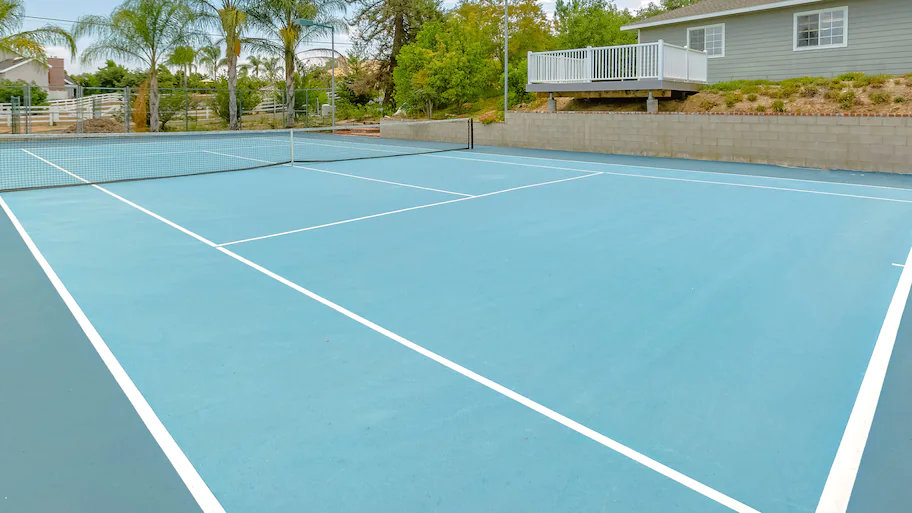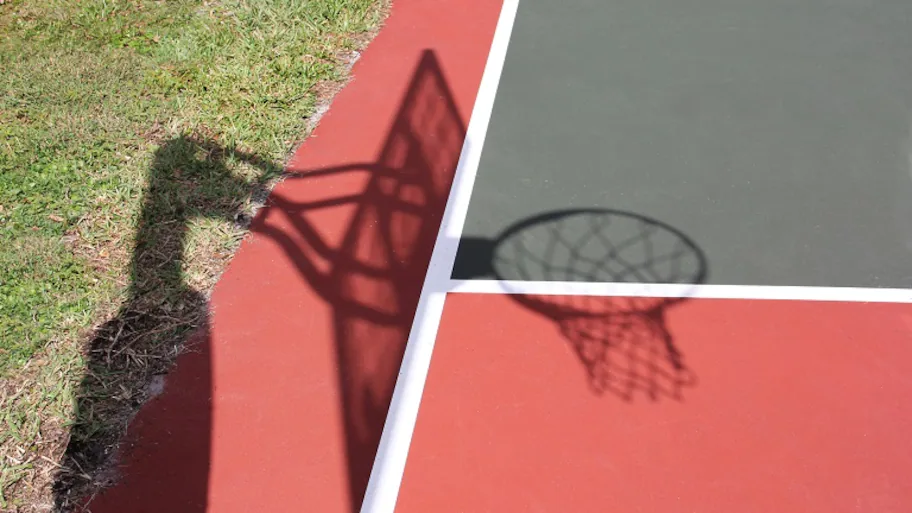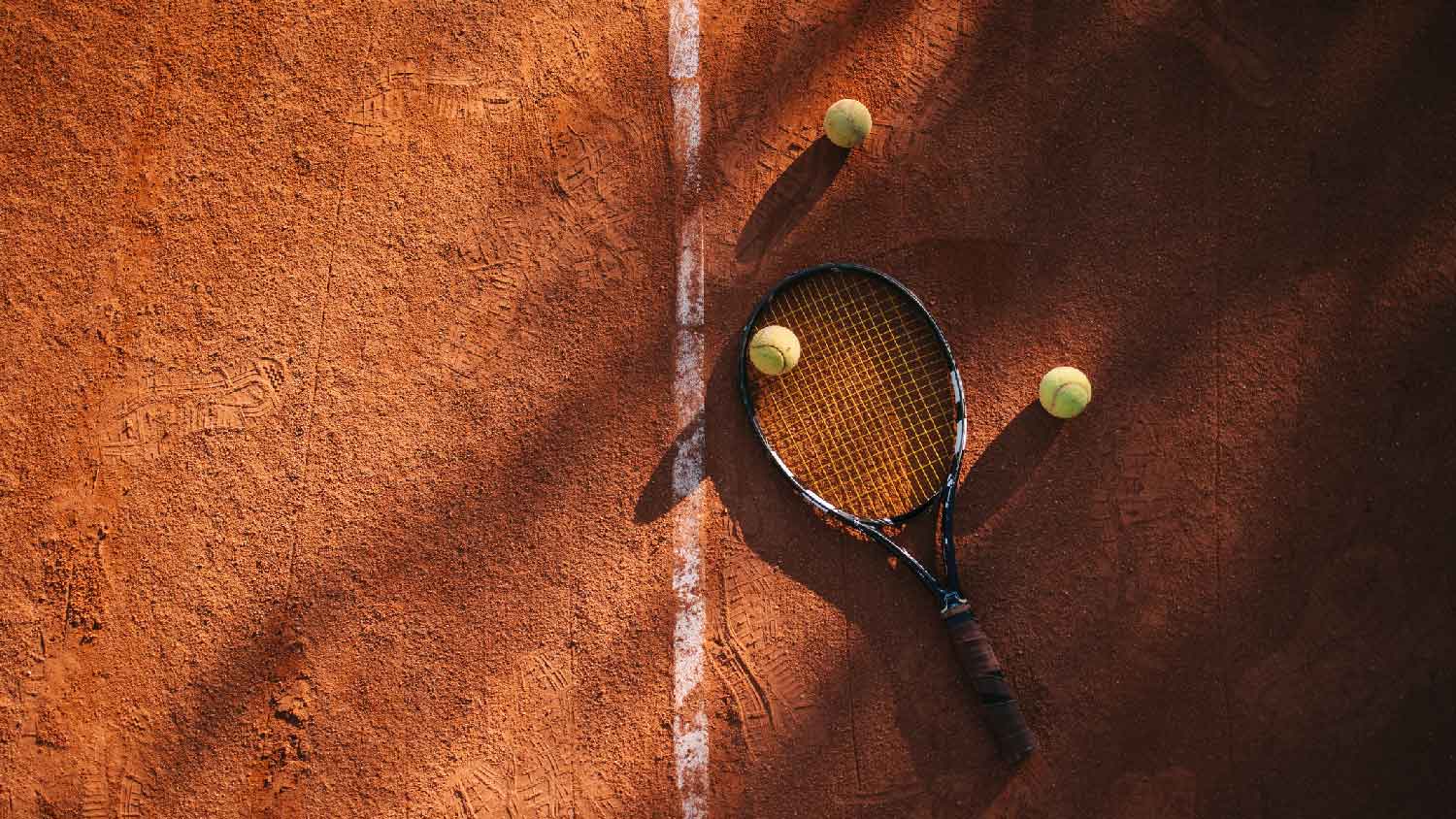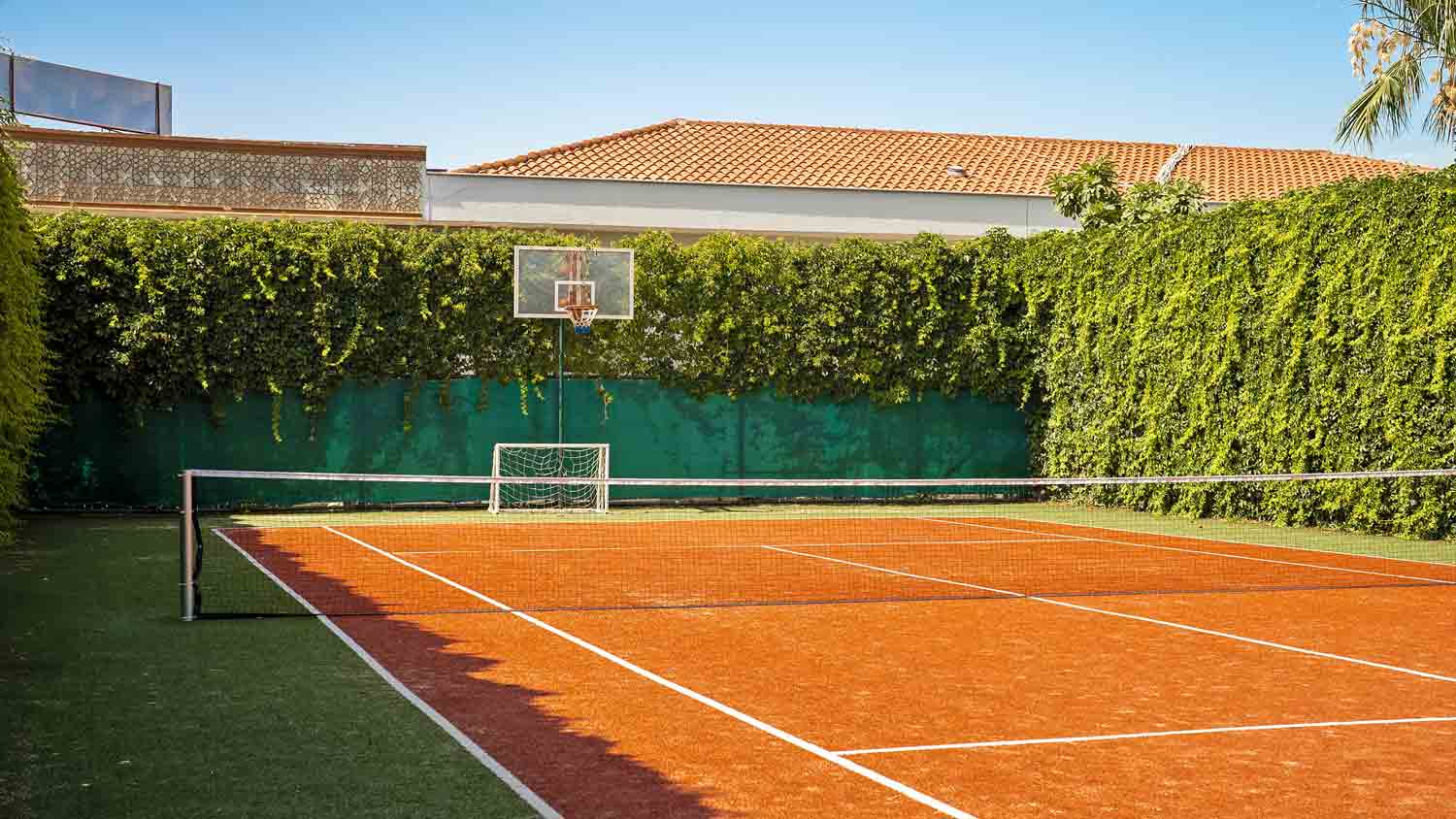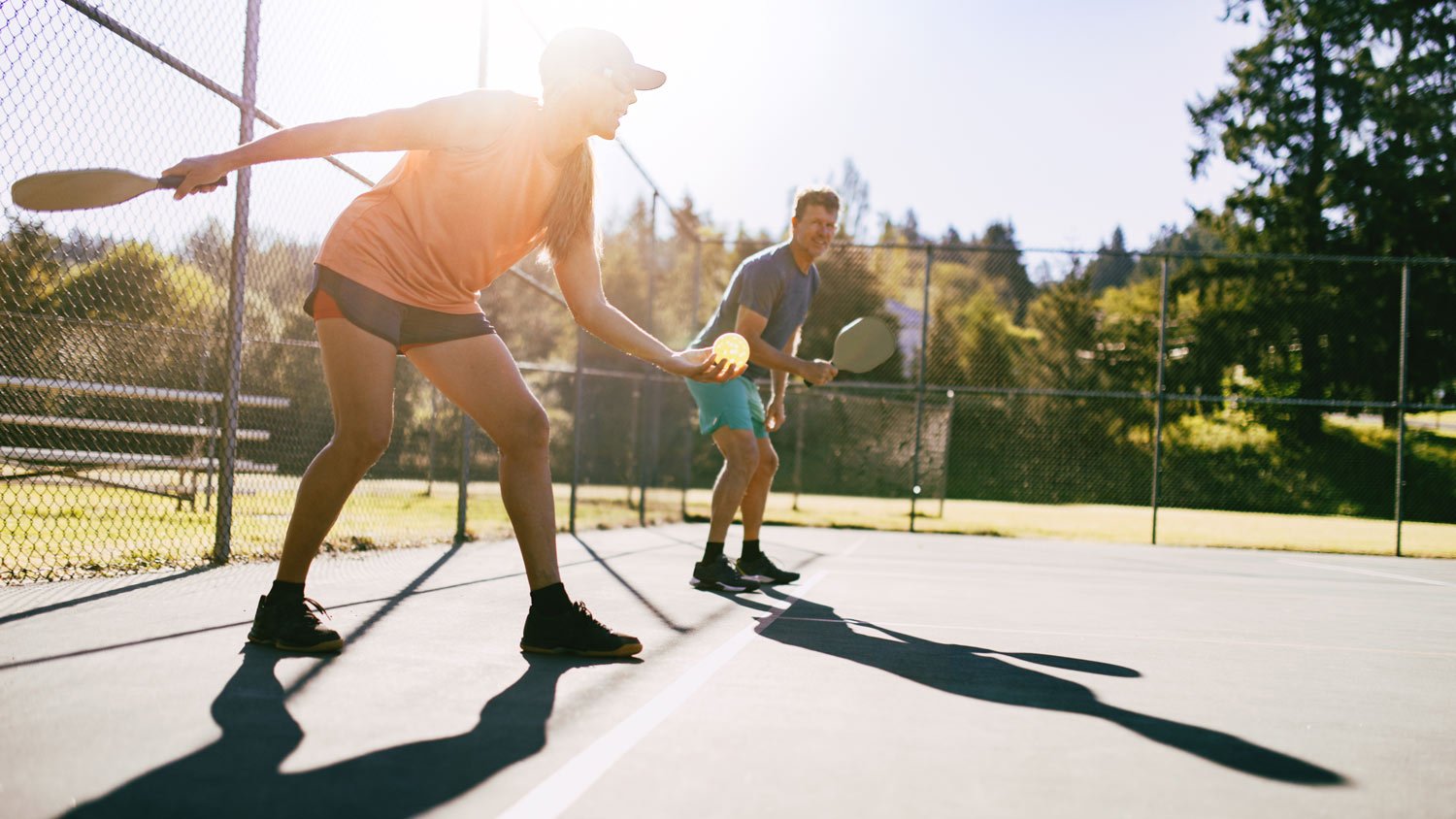How Much Does a Pickleball Court Cost? [2025 Data]
The average pickleball court $35,600, but it can range between $19,400 and $51,800, depending on factors like size and whether you hire a pro to install it.


The average pickleball court cost is $35,600, though many homeowners spend between $10,000 and $83,200. Costs depend on several factors, including the court’s size and surface type. Use this guide to learn all about the different costs associated with building a pickleball court, as well as some ways to save money on this fun home and lifestyle update.
Pickleball Court Cost Factors
The cost of building a pickleball court depends on several factors, like the surface type, materials, size, labor, and site prep. The following sections break down the key expenses so you know what to expect.
Surface Types
The surface material you choose has a major impact on the total cost of your pickleball court. Asphalt is typically the most expensive, averaging $14,300, while rubber falls in the middle at about $10,400. Concrete is the most budget-friendly option, with an average cost of $7,800.
Asphalt is the most expensive because it requires specialized equipment, precise grading, and regular sealing to maintain its appearance. Rubber usually costs more than concrete due to its cushioned design, which is easier on the joints but requires a more involved installation. Concrete is the most affordable because it’s widely available, straightforward to install, and requires minimal upkeep compared to the other options.
| Surface Type | Average Cost (Per Square Foot) | Average Cost (for 880-square-foot court) |
|---|---|---|
| Asphalt | $7–$15 | $6,160–$13,200 |
| Concrete | $4–$8 | $3,520–$7,040 |
| Rubber | $4–$12 | $3,520–$10,560 |
Size
The size of your pickleball court is one of the biggest factors influencing cost. A standard pickleball court is 44 feet long by 20 feet wide (880 square feet), but you’ll need extra space around it for safe play. The recommended total playing area is at least 30 feet by 60 feet (1,800 square feet), though some people opt for a larger area to allow for better movement and additional features like seating or fencing.
| Pickleball Court Size (Square Feet) | Price Range |
|---|---|
| 44’x20’ | $13,200–$35,200 |
| 54’x24’ | $19,400–$51,800 |
| 53’x28’ | $22,300–$59,400 |
| 60’x30’ | $27,000–$72,000 |
| 65’x32’ | $31,200–$83,200 |
Equipment and Features
Building a pickleball court isn’t just about the surface—you’ll need some equipment to actually play and make the court fully functional, like paddles, a net, and a ball. Added features like fencing, lighting, and access to water can make playing more comfortable, but those come at a cost. Here’s a look at what you can expect to spend on equipment and features so you can budget accordingly.
| Equipment and Features | Average Cost |
|---|---|
| Fencing | $3,200–$5,000 |
| Lighting | $4,400–$20,400 |
| Net | $100–$750 |
| Paddle | $30–$200 |
| Paint | $1,900–$5,200 |
| Pickleball | $10–$20 |
| Seating | $200–$1,200 |
| Water fountain | $100–$1,000 |
Grading and Leveling
If your yard isn’t level, grading and leveling are essential for a safe and playable pickleball court. An uneven surface can lead to trip hazards, rolled ankles, and long-term damage to the court itself. Proper grading not only ensures a smooth playing surface but also helps with water drainage, preventing puddles or erosion that could damage the court over time.
Regrading a yard typically costs between $1,000 and $3,300, but the final price depends on the size of your property, the extent of the unevenness, and any drainage issues that need to be addressed. If your yard has steep slopes or poor soil conditions, you may need additional excavation, fill dirt, or even retaining walls, which can drive up costs.
Permits
Some parts of building a pickleball court, like land grading, might require a permit, so it’s something to check on before you get started. Permit costs vary depending on where you live, but they usually run between $100 and $500. If you’re in a high-cost-of-living area, expect to be on the higher end of that range. The good news is that most grading contractors can handle the permit process for you, so be sure to ask about it when getting quotes.
Labor
Labor is one of the biggest costs in building a pickleball court, typically ranging from $6,500 to $15,000, depending on the complexity of the project. Pickleball courts require specialized work at multiple stages, from land prep and grading to surface installation and final detailing. Hiring an experienced asphalt company and other pros will ensure the court is built correctly and minimize long-term maintenance issues.
Here are some fees you might pay when working with a pickleball installation team:
Asphalt contractor costs: $7 to $15 per square foot
Fence installation costs: $6 to $50 per linear foot
Electrician costs: $50 to $100 per hour
Yard leveling costs: $1 to $2 per square foot
Painting labor costs: $1 to $3.50 per square foot or $25 to $100 per hour
Prep
Some yards need serious prep work before installing a pickleball court. Whether it’s clearing out trees, leveling uneven ground, or excavating rocky soil, these extra steps can add to your total cost. The more work your land needs, the higher the price tag, so it’s worth getting an assessment early on. Here’s what you might need to budget for:
Excavation costs: $1,600 to $6,300
Yard leveling costs: $1 to $2 per square foot
Land clearing costs: $250 to $2,800 per half acre depending on land condition
Tree trimming cost: $270 to $1,800
Location
Where you’re building your pickleball court can have a big impact on costs. If your court is going in a hard-to-access area, like a sloped backyard or a site with rocky terrain, you’ll likely pay more for excavation, grading, and foundation work. Generally, land prep costs increase when contractors need to bring in heavy equipment, remove obstacles, or work in tight spaces.
Beyond your yard’s specific challenges, regional cost differences also come into play. Labor and material costs are generally higher in urban areas and states with a high cost of living, so if you’re in a place like California or New York, expect to pay more than in rural areas or states with lower construction costs, like Tennessee or Oklahoma.
Pickleball Court Ongoing Costs

Building a pickleball court isn’t just a one-time expense—you should also factor in ongoing costs to keep it in good shape over the years. Here are some costs to consider before committing to building the court.
Maintenance
Hard surfaces like asphalt and concrete benefit from being pressure washed a few times per year to maintain their appearance. It’s also a good idea to repaint the lines every one to five years as they wear down from use and weather exposure.
Pressure washer rental cost: $50 to $250
Line repainting: $25 to $100 per hour
Operating Costs
If you’re adding lighting for evening games, expect a bump in your electricity bill. LED court lighting is more energy-efficient than traditional lights, but it still adds to monthly costs.
Electricity for lighting: $10 to $50 per month, depending on usage
Repairs
Over time, even the best-built courts develop wear and tear. Surface cracks, drainage issues, and fencing damage are common problems, especially in areas with extreme weather. If your court starts pooling water after rain, you might need to invest in regrading or drainage fixes, which can get pricey.
Asphalt cracks: $1 to $3 per linear foot
Asphalt patching: $100 to $500 per patch
Large asphalt damage: $2 to $5 per square foot
Concrete cracks: $0.10 to $0.15 per linear foot
Large concrete replacement: $6 to $14 per square foot
Concrete potholes: $10 to $150 each
Rubber tile replacement: $2 to $7 per square foot
Insurance
If you’re building a court on your property, check with your home insurance provider to see if you need extra coverage. Some policies already cover personal sports courts, but others require an add-on. If you plan to rent out the court or host tournaments, liability insurance may be another expense to account for so you can protect yourself in case someone gets injured on the court
Home insurance policy adjustment: $50 to $200 per year
Liability insurance): $500 to $2,000 per year
DIY Pickleball Court Installation vs. Hiring a Pro
Building a pickleball court isn’t a basic weekend DIY project—it’s a complex process that requires serious time, effort, and expertise. If you know your way around grading, leveling, and pouring concrete or asphalt, you could potentially save anywhere from $6,500 to $15,000 on labor by tackling it yourself. But for most homeowners, this isn’t the kind of project you want to take on solo.
Getting the surface right is critical for playability and safety, and mistakes can lead to costly repairs down the line. A skilled pro, like a local asphalt contractor, can handle the heavy lifting (literally) and ensure your court is built to last.
Cost of Common Pickleball Court Add-Ons
If you’re hiring professionals to build your pickleball court, they may also handle related projects like landscaping, drainage solutions, or additional paving. Some may bundle these services at a discounted rate, so if you have any other work you need done on your property, you may be able to get a discount by knocking it all out at once.
Landscaping costs: $1,300 to $6,000
Landscape lighting costs: $2,000 to $6,000
Walkway costs: $1,600 to $2,400
Drainage system costs: $2,100 to $7,100
How to Save Money on Building a Pickleball Court
Building a pickleball court isn’t cheap, but there are plenty of ways to cut some costs. Here are some ways to save while still getting a functional, durable court.
Choose concrete for the surface since it’s the most affordable option.
Opt for vinyl-coated chain-link fencing instead of pricier materials like wrought iron or aluminum.
If you have the skills, handle parts of the project yourself to save on labor costs.
Skip unnecessary extras like high-end lighting, benches, scoreboards, and custom netting unless you truly need them.
Look for contractor package deals that bundle grading, surfacing, and fencing at a lower overall cost.
Consider a smaller court size if space allows, since larger courts significantly increase material and labor costs.
Get multiple quotes from contractors to find the best price.
Use existing flat land if possible to avoid costly excavation and grading fees.
How Angi Gets Its Cost Data
Home is the most important place on earth, which is why Angi has helped more than 150 million homeowners transform their houses into homes they adore. To help homeowners with their next project, Angi provides readers with the most accurate cost data and upholds strict editorial standards. We extensively research project costs to develop the pricing data you see, so you can make the best decisions for you and your home. We rely on reputable sources, including the U.S. Bureau of Labor Statistics, academic journals, market studies, and interviews with industry experts—all to ensure our prices reflect real-world projects.
Want to help us improve our cost data? Send us a recent project quote to costquotes@angi.com. Quotes and personal information will not be shared publicly.
Frequently Asked Questions
The life span of your pickleball court depends on factors like the surface material, how well it’s maintained, and your region. However, with proper maintenance, asphalt pickleball courts typically last 10 to 25 years, concrete lasts 10 to 30 years, and rubber lasts 10 to 15 years.
It depends on your needs and interests. If you enjoy the sport and can afford to build a court, then it may be worth it simply as a lifestyle enhancement. Pickleball has also grown in popularity, so if you plan to sell your property in the future, you can expect the court to boost your home’s resale value, potentially providing a return on your investment.
Most pickleball courts take 3 to 6 weeks to complete, but the timeline depends on factors like site prep needed, weather conditions, and contractor availability. If your yard needs extensive grading, drainage work, or tree removal, expect a longer timeline. Once the groundwork is done, pouring and curing concrete or asphalt takes about a week, followed by painting, fencing, and any extras like lighting or seating.
Yes, repurposing an existing tennis or basketball court is one of the cheapest and fastest ways to get a playable pickleball space. If the surface is in good shape, all you need to do is repaint the lines and install a pickleball net. If the surface is cracked or uneven, resurfacing may be necessary, which adds to the cost but is still cheaper than building from scratch.

